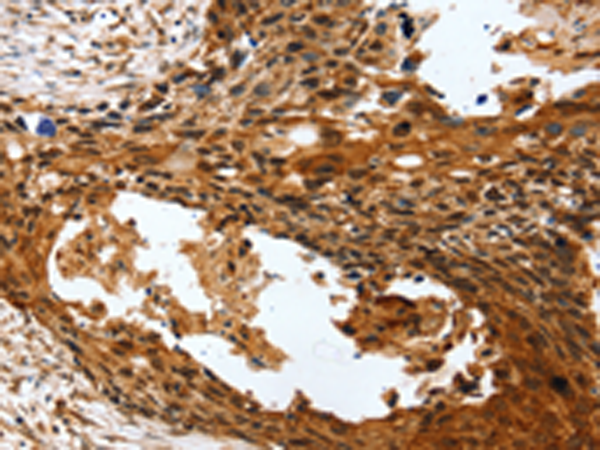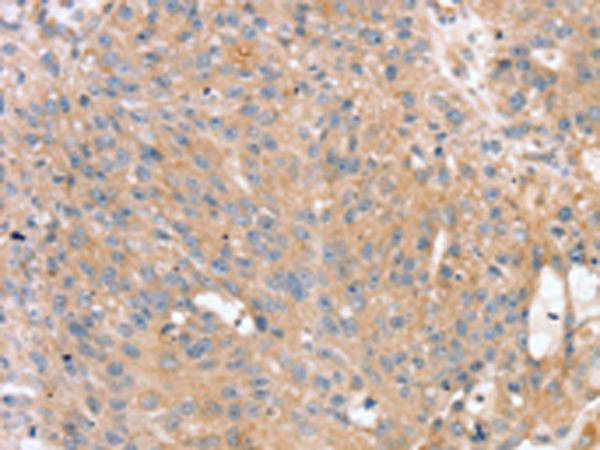


| WB | 咨询技术 | Human,Mouse,Rat |
| IF | 咨询技术 | Human,Mouse,Rat |
| IHC | 1/25-1/100 | Human,Mouse,Rat |
| ICC | 技术咨询 | Human,Mouse,Rat |
| FCM | 咨询技术 | Human,Mouse,Rat |
| Elisa | 1/1000-1/2000 | Human,Mouse,Rat |
| Aliases | TSG-14; TNFAIP5 |
| WB Predicted band size | 42 kDa |
| Host/Isotype | Rabbit IgG |
| Antibody Type | Primary antibody |
| Storage | Store at 4°C short term. Aliquot and store at -20°C long term. Avoid freeze/thaw cycles. |
| Species Reactivity | Human, Mouse |
| Immunogen | Synthetic peptide of human PTX3 |
| Formulation | Purified antibody in PBS with 0.05% sodium azide and 50% glycerol. |
+ +
以下是3篇关于PTX3抗体的代表性文献概览:
---
1. **标题**: *PTX3 as a potential therapeutic antibody target in tumor-associated inflammation*
**作者**: Garlanda C, et al.
**摘要**: 研究证明PTX3在肿瘤微环境中通过调节补体通路促进免疫抑制,开发的人源化PTX3单克隆抗体在小鼠模型中显著抑制肿瘤生长,并增强化疗敏感性(*Nature Immunology*, 2016)。
---
2. **标题**: *Anti-PTX3 antibody blocks FGF2-driven angiogenesis and cancer progression*
**作者**: Bonavita E, et al.
**摘要**: 发现PTX3通过与成纤维细胞生长因子(FGF2)结合促进血管生成,针对PTX3的中和抗体可抑制FGF2信号传导,减少小鼠肿瘤模型中的血管新生和转移(*Journal of Clinical Investigation*, 2020)。
---
3. **标题**: *PTX3-based immunotherapy against Aspergillus infection in neutropenic hosts*
**作者**: Cunha C, et al.
**摘要**: 在小鼠中性粒细胞减少模型中,抗PTX3单克隆抗体通过增强巨噬细胞对烟曲霉菌的吞噬作用,显著提高感染存活率,提示其在真菌免疫治疗中的潜力(*Blood*, 2018)。
---
**备注**:以上文献均聚焦PTX3抗体的治疗应用方向,涉及肿瘤、感染等疾病模型。如需实验诊断类文献或具体抗体开发技术细节,可进一步补充说明。
Pentraxin 3 (PTX3), a member of the long pentraxin family, is a multifunctional soluble pattern recognition receptor critical in innate immunity. Unlike short pentraxins (e.g., CRP), PTX3 is produced locally by immune and stromal cells (e.g., macrophages, endothelial cells) in response to inflammatory signals (e.g., TNF-α, IL-1β) or microbial components. It binds pathogens, extracellular matrix components, and apoptotic cells, modulating complement activation, phagocytosis, and tissue repair. Dysregulated PTX3 expression is implicated in chronic inflammation, autoimmune diseases (e.g., rheumatoid arthritis), cancer, and severe infections (e.g., COVID-19).
PTX3-targeting antibodies have emerged as research tools and potential therapeutics. Neutralizing antibodies block PTX3’s interaction with pathogens or complement factors, potentially mitigating excessive inflammation or infection spread. Conversely, agonist antibodies may enhance PTX3’s protective roles in tissue remodeling. Diagnostic antibodies detect PTX3 levels in serum or tissues as a biomarker for sepsis, cardiovascular diseases, or cancer prognosis. Challenges include balancing PTX3’s dual pro- and anti-inflammatory roles and ensuring tissue-specific targeting. Recent studies explore PTX3 antibodies in preclinical models of fibrosis, viral infections, and tumor immunomodulation, highlighting their translational potential in precision medicine.
×